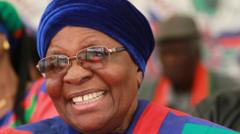In a groundbreaking election, Netumbo Nandi-Ndaitwah has been elected as Namibia's first female president, capturing 57% of the votes cast in a highly competitive race. Her nearest opponent, Panduleni Itula, received 26% and has expressed intentions to contest the validity of the election results, citing various issues, including extended polling periods and logistical difficulties experienced during the vote.
A passionate member of the governing party Swapo since her teenage years, Nandi-Ndaitwah brings a wealth of experience and a commitment to leading Namibia through economic transformation. Born in 1952 in Onamutai, she grew up under the oppressive regime in South West Africa, where she first joined the liberation movement, Swapo, at the tender age of 14.
Her activism was met with resistance, resulting in her arrest and subsequent detention as a student. The oppression she faced propelled her into exile, during which she continued her advocacy work. Nandi-Ndaitwah studied international relations in the UK before returning to a newly independent Namibia in 1988, where she took on various governmental roles including those of minister for foreign affairs and child welfare.
An advocate for women's rights, she championed significant legislation, such as the Combating of Domestic Violence Act in 2002, demonstrating her resolve to confront gender discrimination in a traditionally male-dominated political landscape. Rising through the ranks, Nandi-Ndaitwah became vice-president earlier this year, following the death of former President Hage Geingob.
Her pragmatic leadership style is encapsulated in her declaration, "I am an implementer, not a storyteller." As she embarks on her presidential journey, the nation's attention will be focused on navigating the challenges ahead and addressing the concerns raised by opposition factions. Nandi-Ndaitwah's personal life reflects stability; she is married to Epaphras Denga Ndaitwah, a former chief of Namibia's defence forces, and they have three sons. The unfolding narrative of her presidency will be pivotal for Namibia's future political landscape and gender representation.
A passionate member of the governing party Swapo since her teenage years, Nandi-Ndaitwah brings a wealth of experience and a commitment to leading Namibia through economic transformation. Born in 1952 in Onamutai, she grew up under the oppressive regime in South West Africa, where she first joined the liberation movement, Swapo, at the tender age of 14.
Her activism was met with resistance, resulting in her arrest and subsequent detention as a student. The oppression she faced propelled her into exile, during which she continued her advocacy work. Nandi-Ndaitwah studied international relations in the UK before returning to a newly independent Namibia in 1988, where she took on various governmental roles including those of minister for foreign affairs and child welfare.
An advocate for women's rights, she championed significant legislation, such as the Combating of Domestic Violence Act in 2002, demonstrating her resolve to confront gender discrimination in a traditionally male-dominated political landscape. Rising through the ranks, Nandi-Ndaitwah became vice-president earlier this year, following the death of former President Hage Geingob.
Her pragmatic leadership style is encapsulated in her declaration, "I am an implementer, not a storyteller." As she embarks on her presidential journey, the nation's attention will be focused on navigating the challenges ahead and addressing the concerns raised by opposition factions. Nandi-Ndaitwah's personal life reflects stability; she is married to Epaphras Denga Ndaitwah, a former chief of Namibia's defence forces, and they have three sons. The unfolding narrative of her presidency will be pivotal for Namibia's future political landscape and gender representation.



















